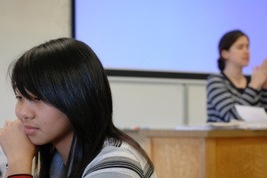From the California Optometric Association
Your child may have trouble seeing if they aren’t performing to their potential in school, or have behavioral problems.
The back-to-school season is the time to make sure your child is fully prepared and ready to take on the challenges of school. Perhaps the most overlooked, yet immensely important part of that preparation is the all-important vision exam. There is a very strong relationship between vision and learning, as well as vision and behavior in the classroom.
The back-to-school season is the time to make sure your child is fully prepared and ready to take on the challenges of school. Perhaps the most overlooked, yet immensely important part of that preparation is the all-important vision exam. There is a very strong relationship between vision and learning, as well as vision and behavior in the classroom.
Children who do not have the necessary visual-motor and visual-perceptual skills to compete in the classroom with their classmates, may act out, be easily distracted, or not be able to pay enough attention to perform to their potential. An extreme example of this is with juvenile delinquents. A more than 15-year study at the San Bernardino Juvenile Hall revealed that a much higher percentage of juvenile delinquents have vision problems than in the average population. According to the study, by Stan Kaseno and Kristy Remick, poor visual skills can contribute to poor self-esteem, which can lead to poor attitudes and behavior in school. After a program that addressed the inmates problems, including vision and victims’ awareness classes, the recidivism or repeat offender rate decreased from 90% to 15%.
All students should have their vision and visual skills checked yearly by their doctor of optometry (optometrist) before going back to school to make sure they have the learning readiness skills that are so important to academic and athletic performance.
Here are signs to look out for that could indicate that your child has a possible vision problem:
Behavioral Signs
Signs of Difficulty with Visually-Related Tasks
If your child has any of the above problems, and is not performing to their potential in school and sports, have their eyesight and visual skills checked as soon as possible to detect, and treat any underlying vision problems that may be interfering with their performance.
All students should have their vision and visual skills checked yearly by their doctor of optometry (optometrist) before going back to school to make sure they have the learning readiness skills that are so important to academic and athletic performance.
Here are signs to look out for that could indicate that your child has a possible vision problem:
Behavioral Signs
- Poor attention in the classroom
- Not performing to potential
- Doesn’t like, or refuses to do homework
- Doesn’t like sports
- Slow reader
- Difficulty completing timed exams on time
Signs of Difficulty with Visually-Related Tasks
- Loses place frequently while reading
- Headaches or eyestrain associated with reading or computer use
- Words go in and out of focus
- Words appear to “move” on the page
- Double vision (constant or intermittent)
- Having to re-read over and over for comprehension
- Difficulty recalling what was read
- Poor handwriting
If your child has any of the above problems, and is not performing to their potential in school and sports, have their eyesight and visual skills checked as soon as possible to detect, and treat any underlying vision problems that may be interfering with their performance.

